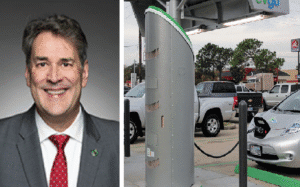Ottawa, Ontario — According to Clean Energy Canada, the federal government is considering repealing Canada’s Electric Vehicle Availability Standard, a set of regulations requiring automakers to offer a growing percentage of zero-emission vehicles for sale each year, reaching 100 percent by 2035.
The standard, introduced late last year, is a cornerstone of Canada’s climate strategy to reduce greenhouse gas emissions from transportation, which accounts for nearly 25 percent of the country’s total emissions. Changes under review could involve easing the annual targets or altering compliance mechanisms, potentially slowing the pace at which electric vehicles become widely available to Canadian consumers.
In a press release, Clean Energy Canada expressed concern that any weakening of the standard would jeopardize Canada’s leadership in the clean transportation transition. The group argues that maintaining strong, predictable regulations is essential to drive automakers’ investment decisions and help the country meet its ambitious climate goals.
“Canada is facing pressure to repeal its Electric Vehicle Availability Standard… from a traditional auto sector that is headquartered in and highly integrated with the United States,” the watchdog organization wrote in a press release. “This pressure comes at a moment when American EV and clean energy policy is moving starkly away from the direction the rest of the world is headed.”
Clean Energy Canada also created a four-part framework for the government to implement in order to make EVs affordable for more Canadians. The first part of the framework involves retooling the EV Availability Standard to help support consumer choice by attracting models at competitive price points.
“If the federal government is going to revisit its targets, it should focus on near-term adjustments to help automakers weather this temporary storm while maintaining the longer-term trajectory and market signal that Canada is committed to going electric,” the group wrote. “Any additional flexibility added in the regulation should be designed to achieve other EV-related goals, such as delivering more affordable EVs and building out Canada’s charging network.”
The second step involves reigniting interest in EVs by recapitalizing the now-defunct EV rebate program. “The rebate should start at $5,000 and decline by $1,000 each year, providing consumers and automakers with a well-communicated phaseout that avoids periods of artificially lowered EV sales as buyers await the return of rebates or at least clarity.”
The final step would involve reconsidering Canada’s trade approach by lowering the tariff on Chinese-made EVs. “Doing so would open Canada’s vehicle market to fill important market gaps, drive innovation and ultimately make our auto sector more competitive.”
It also warns that relaxing the standard could send mixed signals to the market, slowing innovation and adoption of EVs at a time when global competitors are accelerating their electric vehicle programs.




















